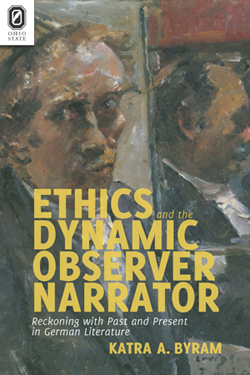Ethics and the Dynamic Observer NarratorReckoning with Past and Present in German LiteratureKatra A. ByramTheory and Interpretation of Narrative |
 2/20/2015 LITERARY CRITICISM / European / German 296 pp. 6x9  $67.95 cloth 978-0-8142-1276-9 Add cloth to shopping cart $27.95 paper 978-0-8142-5200-0 Add paper to shopping cart $27.95 PDF eBook 978-0-8142-7557-3 Add PDF eBook to shopping cart Shopping Cart Instructions Review/Change Shopping Cart & Check-out | |||
|
“This is a marvelous study in which Katra Byram proposes a new genre, that of the dynamic observer narrative—stories told by a first-person narrator about another person’s experiences. To provide examples of the dynamic observer narrative, Byram takes up some of the most well-known and thoroughly analyzed German novels of the last two centuries. But because her lens is truly original, hers are not just new ‘readings’ of these works; rather, she offers a tool to rethink the relationship between literary production and history and the concept of Vergangenheitsbewältigung—or coming to terms with the past. All students of narrative theory and all students of German prose fiction will want and need to read this book.” —Irene Kacandes, The Dartmouth Professor of German Studies and Comparative Literature “In Ethics and the Dynamic Observer Narrator, Byram connects issues of narrative ethics in German literature to the pre-WWII context. As such, the book is an excellent contribution to a broader view of narrative responsibility in the context of German literature, especially German novels since the late eighteenth century. Byram includes the traditions of realist criticism, which informs her readings of post-war texts in useful ways. This book will be of interest to scholars of Sebald, Raabe, and Storm, as well as to those interested in Textor, Grass, and Handke. Scholars of narrative theory and rhetoric will also want to read this book.” —Scott Denham, Charles A. Dana Professor of German Studies, Davidson CollegeIn Ethics and the Dynamic Observer Narrator: Reckoning with Past and Present in German Literature, Katra A. Byram proposes a new category—the dynamic observer form—to describe a narrative situation that emerges when stories about others become an avenue to negotiate a narrator’s own identity across past and present. Focusing on German-language fiction from the nineteenth and twentieth centuries, Byram demonstrates how the dynamic observer form highlights historical tensions and explores the nexus of history, identity, narrative, and ethics in the modern moment. Ethics and the Dynamic Observer Narrator contributes to scholarship on both narrative theory and the historical and cultural context of German and Austrian literary studies. Narrative theory, according to Byram, should understand this form to register complex interactions between history and narrative form. Byram also juxtaposes new readings of works by Textor, Storm, and Raabe from the nineteenth century with analyses of twentieth-century works by Grass, Handke, and Sebald, ultimately reframing our understanding of literary Vergangenheitsbewältigung, or the struggle to come to terms with the past. Overall, Byram shows that neither the problem of reckoning with the past nor the dynamic observer form is unique to Germany’s post-WWII era. Both are products of the dynamics of modern identity, surfacing whenever critical change separates what was from what is.Katra A. Byram is assistant professor in the Department of Germanic Languages and Literatures at The Ohio State University. | ||||

